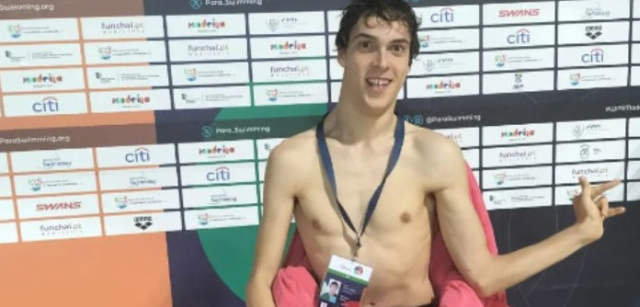He debuted in the S2 category at the Paralympics the same year as his international debut. He will compete in the 100 and 50-meter backstroke events (August 29 and 31, respectively) and the 200-meter freestyle on September 2.
The Paris Paralympic Games, which began this Wednesday, bring together 4,400 of the world’s most outstanding Paralympic athletes who will compete in various disciplines over eleven days.
Mikel Erdozain Oterino (Leioa 2002) arrived at swimming after trying out various sports: table tennis, climbing, chess (Basque Country team champion), surfing, and boccia, in which he won gold in the Spanish Championship in the youth category.
He was born with dystonic spastic tetraparesis and dyskinesia—uncontrolled movements of the limbs, trunk, or face—caused by oxygen deprivation during birth due to a nuchal umbilical cord. “I have a 75% disability, with problems maintaining balance. Everyday activities require more effort from me, like dressing, showering, eating, speaking, or studying. However, I’m quite independent. I move slowly but steadily,” he explains.
“I still greatly enjoy my summers in Sangüesa/Zangoza, swimming in the river and the reservoir. My friends devised strategies to make sure I never got left behind. If they went kayaking or jumped from the top of the dam, I did too, much to my parents’ horror. They even put me on the back of their bicycles,” he recalls.
Last year, Mikel completed his Advanced Degree in Healthcare Administration and Documentation, and he is now preparing for civil service exams.
He set short-term goals, and each small achievement fueled his determination. He used to get around in a wheelchair, though at home he moved on his knees, even playing as a goalie in soccer games with his friends. “During childhood, I suffered through all kinds of ‘torture devices,’” he laughs, “like standing frames, postural beds, and braces. When I was 11, I had a fibrotomy, which, along with physical therapy, helped me improve my walking and balance. I started walking at home, holding onto whatever I could, despite taking a few falls. Now I use a walker, but for longer distances, I rely on an electric wheelchair,” he says.
His discoverer and coach, Natalia Folgado, persisted with him again and again. Some thought he would never swim independently, but they never gave up.
Despite being only 20 years old, he has made it to the international elite in swimming and received an unexpected reward: a spot in the Paris 2024 Paralympic Games.
“I still can’t believe it—it’s been such a rush. I’m very grateful to everyone who has believed in me,” he says. In a short time, he has gone from wearing a life jacket and needing support to avoid sinking to being among the best in the major event. “When achieving things is so difficult, the satisfaction is enormous. Not to mention the freedom I feel while swimming, without needing floaties, and the physical and psychological benefits it brings me. Swimming has helped me build muscle and improve my posture,” he points out.
To encourage the participation of swimmers from lower classes that include more severe disabilities—he competes in the S2 class—the International Paralympic Committee granted him an invitation to the European Championships in Madeira (Portugal) in April, as well as to this summer’s Paralympic Games. In the French capital, he will compete in the 50-meter backstroke, 100-meter backstroke, and 200-meter freestyle events. “I never imagined I would make it this far. Going to the Games is a source of pride, a reward for so many years of sacrifice, and it motivates me to keep pushing myself and set new goals. I know I still have a long way to go, and my times are far below the best, so in Paris, I would be happy just to beat my own personal records and gain experience for future competitions,” adds Mikel Erdozain Oterino, who, far from sinking, is now soaring towards his Paralympic dream.
Just two weeks after the Olympic flame was extinguished, Paris is ready to host its second Games of the summer. The Paralympics have arrived, and until September 8, they will capture the attention of the French capital. Once again, Basque athletes will be seeking their moment in the spotlight. While 33 Basque athletes competed in the Olympic Games, there will also be a significant representation at the Paralympics. One of the largest groups in recent decades will be traveling to Paris, far surpassing the numbers seen in the last four summer Paralympic Games.





